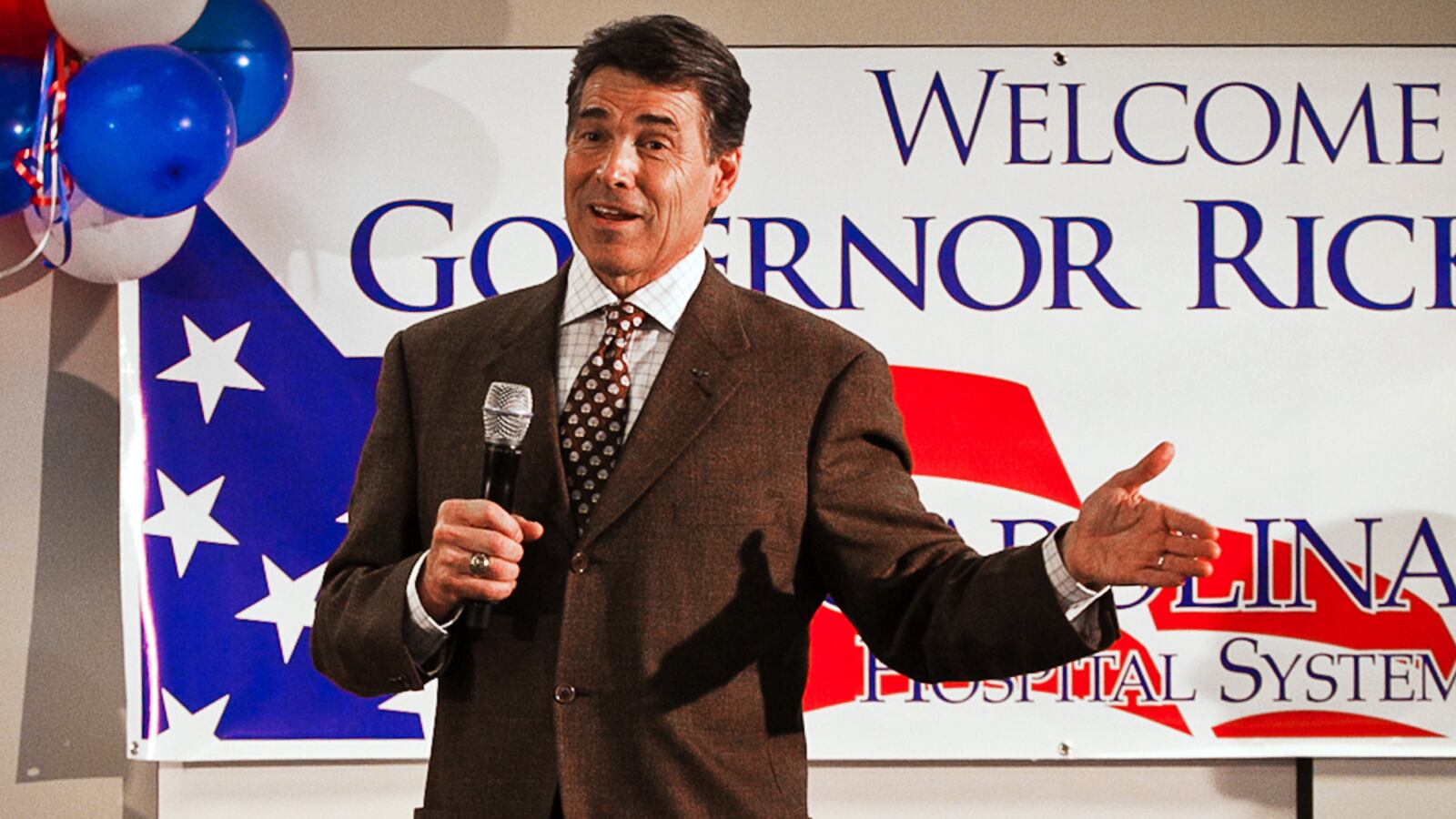He’s a walking, talking symbol of the culture war, and that’s just the first obstacle standing between Rick Perry and a general-election victory. To the chagrin of Mitt “I’m Electable” Romney, Republican primary voters are flocking to the Texas governor anyway. They’re not worried about the attitudes and demographics of the states that will decide the next president—but maybe they should be.
Perry has burst onto the GOP field as the mythical movie version of a politician—the tough, straight-talking cowboy who never shies from a shootout with enemies or a shout-out to God. All that and a brag-worthy jobs record as governor. In short, he’s the anti-Obama. It’s no wonder so many Republicans are smitten.
But Perry’s strengths are also potential weaknesses. He is so steeped in Austin and Paint Creek, and has such a colorfully controversial paper and video trail, that his campaign persona may be a hard sell in precincts outside the Lone Star State. What’s more, he enjoys reinforcing the archetype, or at least he did before he became a national candidate. He is, he wrote in his 2010 book Fed Up, “the kind of guy who goes jogging in the morning, packing a Ruger .380 with laser sights loaded with hollow point bullets, and shoots a coyote that is threatening his daughter’s dog.”
What’s a swing-state suburban voter supposed to make of that? How will seniors respond to his repeated descriptions of Social Security as a fraudulent, “illegal Ponzi scheme” akin to the one that put Bernie Madoff in prison, or his view that Medicare is a constitutional overreach? How will moderate and independent voters view his overt religiosity, or his outright skepticism toward evolution and global warming? Will they agree with him that the 16th Amendment, which allows the federal government to collect and spend an income tax, and the 17th Amendment, which allows voters rather than state legislatures to choose senators, were pivotal mistakes? How about his stated goal of making the federal government as “inconsequential” as possible in people’s lives?
For all these reasons, Perry would energize the Tea Party wing of the GOP. The problem for the party is that for the same reasons, he’d light a fire under dispirited Democrats and possibly alienate large swaths of swing voters. He’s already polling worse than Romney among independents. Brad Coker, managing director of Mason-Dixon Polling & Research, wonders if the GOP is on a path to repeat its 2010 mistake of picking Senate nominees who lost winnable seats, among them Sharron Angle in Nevada, Christine O’Donnell in Delaware, and Ken Buck in Colorado. “Is Rick Perry going to fall into that mold? It’s hard to say, but the potential is there,” Coker says.

Given Perry’s views on Medicare and Social Security, seniors are likely to be wary of him. That presents a challenge for Perry, as four of the five states with the grayest populations are swing states: Florida, Pennsylvania, Maine, and Iowa. Nearly a third of general-election voters in Florida are over 65, says Coker. Many polls have shown two-to-one majorities of voters saying they’d rather see politicians raise taxes than cut Social Security or Medicare. Republicans attacked Democrats over Medicare cuts in the new health-care law to great effect in 2010. But the weapon has now changed hands, as almost all congressional Republicans voted to replace Medicare with vouchers for private insurance. Democrats won a special House election in New York on the strength of the issue, suggesting it is shaping up as a problem for the GOP and Perry in particular.
The idea of making Washington inconsequential is not particularly popular nationally; it’s bound to be an especially hard sell in states reeling from the recession and housing bust. Of the 10 states with the highest unemployment rates, four are swing states: Nevada, Michigan, Florida, and North Carolina. The 10 states with the most foreclosures include Nevada, Florida, Michigan, and Wisconsin. And New Mexico, Michigan, and Maine are among the 10 states that rely most on food stamps. Perry’s bootstrap, bash-the-feds message may need some major tweaking to inspire confidence in places like these.
That’s also true of Perry’s religious style. He wears his faith on his sleeve, as he demonstrated with an extraordinary rally he sponsored last month called The Response. “Father, our heart breaks for America,” Perry told 30,000 people at Houston’s Reliant Stadium. The event reinforced his bond with conservative evangelicals and was followed a week later by his entry into the presidential race. Not surprisingly, Perry is a crusader against abortion and same-sex marriage. He calls evolution a theory “out there” with some gaps in it.
In his 2008 book On My Honor, Perry says attacks on the Boy Scouts, who have banned gay scoutmasters, are a microcosm of a culture war that pits “service, selflessness, and sacrifice” against “the forces of relativity,” such as the American Civil Liberties Union, and those who would suppress religious freedom. He lectures alcoholics and homosexuals for “choosing” to drink or to have sexual relations with someone of the same gender. Homosexuals, he says, “must respect the right of millions in society to refuse to normalize their behavior.”
Yet Perry is out of step with millions in these views. In the ultimate “normalization” step, majorities in several recent polls say gay people should be allowed to marry each other. Terry Madonna, director of the Franklin & Marshall College Poll, uses gay marriage as an example of how Perry’s cultural positions could hurt him in the heavily populated Philadelphia suburbs, the state’s key swing area. One of his polls found 52 percent support for gay marriage in those suburbs. The highest level of support anywhere else in the state, including Philadelphia, was 35 percent.
“Any candidate running will have to be careful of how conservative they are on the social questions,” Madonna says. “Suburban, middle-class, college-educated voters … will reject extreme culturally conservative positions.”
Another potential problem stemming from religion comes from Perry’s reading list. Turning the Tide by Charles Stanley, one of the books on it, is advertised as “practical steps Christians can take to turn the tide” against taxes, deficits, abortion, disrespect for Israel, and vilification of Jesus. Stanley seems to suggest that one goal is conversion of Muslims and Jews. He urges Christians to pray that “Muslims throughout the world will come to know Jesus as their savior” and that “Jews worldwide accept Him as their savior.”
Jews make up 5 to 7 percent of the electorate in Florida. One of the things they’d be likely to know about Perry by November 2012 is that he was reading this book. Coker, who has been polling in Florida since 1984, says 7 percent of the vote is enough to make a difference in a state that is so closely divided. Al Gore ran even with George W. Bush in Florida in 2000 because his Orthodox Jewish vice presidential pick, Joe Lieberman, drew independent and Republican-leaning Jewish voters to the ticket, according to Coker. “Somebody who’s talking about converting Jews to Christians isn’t going to do very well even with Jewish Republicans,” he says.
The regional flavor of Perry’s candidacy may also be problematic in Florida and elsewhere. As Coker notes, the state has heavy concentrations of transplants from the Northeast and Midwest. Romney, a former Massachusetts governor raised in Michigan, has ties to both, Perry to neither.
Republicans in the Northeast and Midwest are different from those in the South. New Hampshire, a swing state as well as a key primary state, is a case in point. Gallup has rated it the second-least-religious state in the country. Andrew Smith, director of the University of New Hampshire Survey Center, says six in 10 Republicans there are moderate, business-oriented Rockefeller Republicans. In the competitive 2008 New Hampshire GOP primary, three moderates—John McCain, Mitt Romney, and Rudy Giuliani—captured three quarters of the vote. Mike Huckabee, who rode evangelical support to a victory that year in the Iowa caucuses, days later drew just 11 percent of the vote in New Hampshire.
And then there is Election Day. Polls in a number of swing states show Romney doing better than Perry in theoretical match-ups against Obama. In Pennsylvania, for instance, Obama leads Romney by 6 points and Perry by 11 points in a new Franklin & Marshall poll. Public Policy Polling, meanwhile, says Romney does 2 to 10 points better than Perry against Obama in Ohio, Iowa, Virginia, North Carolina, Wisconsin, Colorado, Nevada, and Michigan.
In this season of escalating rivalries and debates, Perry may yet prove himself up to the task of reassuring whole regions of the nation that they would be sending a job creator, not an evangelical culture warrior, to the White House. For now the numbers suggest that electability is an issue ripe for examination by Republicans who think they see the Oval Office within reach.






